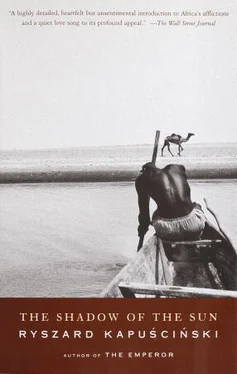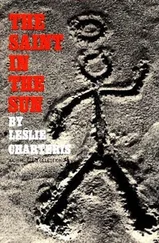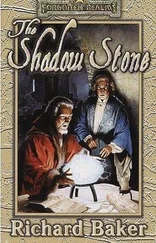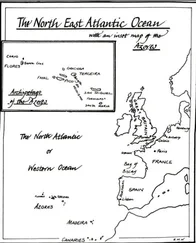Ryszard Kapuscinski
The Shadow of the Sun
I lived in Africa for several years. I first went there in 1957. Then, over the next forty years, I returned whenever the opportunity arose. I traveled extensively, avoiding official routes, palaces, important personages, and high-level politics. Instead, I opted to hitch rides on passing trucks, wander with nomads through the desert, be the guest of peasants of the tropical savannah. Their life is endless toil, a torment they endure with astonishing patience and good humor.
This is therefore not a book about Africa, but rather about some people from there — about encounters with them, and time spent together. The continent is too large to describe. It is a veritable ocean, a separate planet, a varied, immensely rich cosmos. Only with the greatest simplification, for the sake of convenience, can we say “Africa.” In reality, except as a geographical appellation, Africa does not exist.
R.K.
The Beginning: Collision, Ghana, 1958
More than anything, one is struck by the light. Light everywhere. Brightness everywhere. Everywhere, the sun. Just yesterday, an autumnal London was drenched in rain. The airplane drenched in rain. A cold wind, darkness. But here, from the morning’s earliest moments, the airport is ablaze with sunlight, all of us in sunlight.
In times past, when people wandered the world on foot, rode on horseback, or sailed in ships, the journey itself accustomed them to the change. Images of the earth passed ever so slowly before their eyes, the stage revolved in a barely perceptible way. The voyage lasted weeks, months. The traveler had time to grow used to another environment, a different landscape. The climate, too, changed gradually. Before the traveler arrived from a cool Europe to the burning Equator, he already had left behind the pleasant warmth of Las Palmas, the heat of Al-Mahara, and the hell of the Cape Verde Islands.
Today, nothing remains of these gradations. Air travel tears us violently out of snow and cold and hurls us that very same day into the blaze of the tropics. Suddenly, still rubbing our eyes, we find ourselves in a humid inferno. We immediately start to sweat. If we’ve come from Europe in the wintertime, we discard overcoats, peel off sweaters. It’s the first gesture of initiation we, the people of the North, perform upon arrival in Africa.
People of the North. Have we sufficiently considered the fact that northerners constitute a distinct minority on our planet? Canadians and Poles, Lithuanians and Scandinavians, some Americans and Germans, Russians and Scots, Laplanders and Eskimos, Evenkis and Yakuts — the list is not very long. It may amount to no more than 500 million people: less than 10 percent of the earth’s population. The overwhelming majority live in hot climates, their days spent in the warmth of the sun. Mankind first came into being in the sun; the oldest traces of his existence have been found in warm climes. What was the weather like in the biblical paradise? It was eternally warm, hot even, so that Adam and Eve could go about naked and not feel chilled even in the shade of a tree.
Something else strikes the new arrival even as he descends the steps of the airplane: the smell of the tropics. Perhaps he’s had intimations of it. It is the scent that permeated Mr. Kanzman’s little shop, Colonial and Other Goods, on Perec Street in my hometown of Pińsk. Almonds, cloves, dates, and cocoa. Vanilla and laurel leaves, oranges and bananas, cardamom and saffron. And Drohobych. The interiors of Bruno Schulz’s cinammon shops? Didn’t their “dimly lit, dark, and solemn interiors” smell intensely of paints, lacquer, incense, the aroma of faraway countries and rare substances? Yet the actual smell of the tropics is somewhat different. We instantly recognize its weight, its sticky materiality. The smell makes us at once aware that we are at that point on earth where an exuberant and indefatigable nature labors, incessantly reproducing itself, spreading and blooming, even as it sickens, disintegrates, festers, and decays.
It is the smell of a sweating body and drying fish, of spoiling meat and roasting cassava, of fresh flowers and putrid algae — in short, of everything that is at once pleasant and irritating, that attracts and repels, seduces and disgusts. This odor will reach us from nearby palm groves, will escape from the hot soil, will waft above stagnant city sewers. It will not leave us; it is integral to the tropics.
And finally, the most important discovery — the people. The locals. How they fit this landscape, this light, these smells. How they are as one with them. How man and environment are bound in an indissoluble, complementary, and harmonious whole. I am struck by how firmly each race is grounded in the terrain in which it lives, in its climate. We shape our landscape, and it, in turn, molds our physiognomy. Among these palm trees and vines, in this bush and jungle, the white man is a sort of outlandish and unseemly intruder. Pale, weak, his shirt drenched with sweat, his hair pasted down on his head, he is continually tormented by thirst, and feels impotent, melancholic. He is ever afraid: of mosquitoes, amoebas, scorpions, snakes — everything that moves fills him with fear, terror, panic.
With their strength, grace, and endurance, the indigenous move about naturally, freely, at a tempo determined by climate and tradition, somewhat languid, unhurried, knowing one can never achieve everything in life anyway, and besides, if one did, what would be left over for others?
I’ve been here for a week. I am trying to get to know Accra. It is like an overgrown small town that has reproduced itself many times over, crawled out of the bush, out of the jungle, and come to a halt at the shores of the Gulf of Guinea. Accra is flat, single-storied, humble, though there are some buildings with two or more floors. No sophisticated architecture, no excess or pomp. Ordinary plaster, pastel-colored walls — pale yellow, pale green. The walls have numerous water stains. Fresh ones. After the rainy season, entire constellations of stains appear, collages, mosaics, fantastical maps, flowery flourishes. The downtown is densely built up. Traffic, crowds, bustle — life takes place out in the street. The street is a roadway delineated on both sides by an open sewer. There are no sidewalks. Cars mingle with the crowds. Everything moves in concert — pedestrians, automobiles, bicycles, carts, cows, and goats. On the sides, beyond the sewer, along the entire length of the street, domestic scenes unfold. Women are pounding manioc, baking taro bulbs over the coals, cooking dishes of one sort or another, hawking chewing gum, crackers, and aspirin, washing and drying laundry. Right out in the open, as if a decree had been issued commanding everyone to leave his home at 8 a.m. and remain in the street. In reality, there is another reason: apartments are small, cramped, stuffy. There is no ventilation, the atmosphere inside is heavy, the smells stale, there is no air to breathe. Besides, spending the day in the street enables one to participate in social life. The women talk nonstop, yell, gesticulate, laugh. Standing over a pot or a washbasin, they have an excellent vantage point. They can see their neighbors, passersby, the entire street; they can listen in on quarrels and gossip, observe accidents. All day long they are among others, in motion, and in the fresh air.
A red Ford with a speaker mounted on its roof passes through the streets. A hoarse, penetrating voice invites people to attend a meeting. The main attraction will be Kwame Nkrumah — Osagyefo, the prime minister, the leader of Ghana, of Africa, of all downtrodden peoples. There are photographs of Nkrumah everywhere — in the newspapers (every day), on posters, on flags, on ankle-length percale skirts. The energetic face of a middle-aged man, either smiling or serious, at an angle meant to suggest that he is contemplating the future.
Читать дальше












